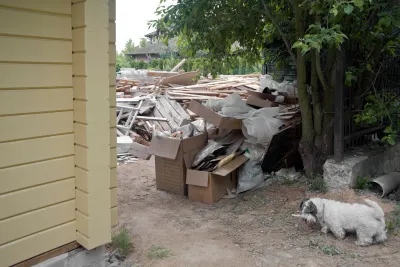Local officials in Gilbert, Arizona, say a new town ordinance that will fine homeowners for unsightly debris in their backyards is about fighting blight; critics say it’s a violation of their Fourth Amendment right against unreasonable search and seizure.

Gilbert, Arizona—home of the 2015 sign code case heard round the planning world, Reed v. Town of Gilbert—is in the news again for a new town ordinance the city says is aimed at battling blight. According to local news outlet 12 News, the Gilbert Town Council recently voted 5-1 “to adopt the Community Preservation Ordinance that would fine homeowners up to $500 for having dead grass, piled up debris, and cars that don't work in their yards.” While that might not seem all that unusual, what sets this ordinance apart is it applies to homeowners’ backyards (previously the town could only address blight if it posed life and safety issues and only in front and side yards, according to an article from Gilbert US News) and heavily relies on neighbors reporting on neighbors.
Golightly spoke to Gilbert resident Chris Lindahl who is concerned the ordinance “gives the town too much power and control over people's yards. He also didn't like the idea that neighbors who lives in two story houses could look into his backyard and report him to Code Compliance if they didn't like what they saw.” He sees it as a potential violation of the Fourth Amendment, which protects people from unreasonable searches and seizures by the government.
Town planning manager Eva Cutro told 12 News that the ordinance is aimed at preserving the community from blight and said the ordinance has written protections so that state and constitutional rights will not be violated. “She also said they will report to the council every three months to make sure the system is not being abused and will make changes to the ordinance if necessary. Cutro added that they do not plan on giving citations out right away and plan on working with homeowners first to get the problem situated.”
The lone dissenter town council, Councilman Jim Torgeson, told Gilbert US News, he understands the need for such an ordinance but is concerned with its dependence on use of discretion by code compliance officers, but might that lead to inconsistent enforcement of the ordinance?

National Parks Layoffs Will Cause Communities to Lose Billions
Thousands of essential park workers were laid off this week, just before the busy spring break season.

Retro-silient?: America’s First “Eco-burb,” The Woodlands Turns 50
A master-planned community north of Houston offers lessons on green infrastructure and resilient design, but falls short of its founder’s lofty affordability and walkability goals.

Delivering for America Plan Will Downgrade Mail Service in at Least 49.5 Percent of Zip Codes
Republican and Democrat lawmakers criticize the plan for its disproportionate negative impact on rural communities.

Test News Post 1
This is a summary

Test News Headline 46
Test for the image on the front page.

Balancing Bombs and Butterflies: How the National Guard Protects a Rare Species
The National Guard at Fort Indiantown Gap uses GIS technology and land management strategies to balance military training with conservation efforts, ensuring the survival of the rare eastern regal fritillary butterfly.
Urban Design for Planners 1: Software Tools
This six-course series explores essential urban design concepts using open source software and equips planners with the tools they need to participate fully in the urban design process.
Planning for Universal Design
Learn the tools for implementing Universal Design in planning regulations.
EMC Planning Group, Inc.
Planetizen
Planetizen
Mpact (formerly Rail~Volution)
Great Falls Development Authority, Inc.
HUDs Office of Policy Development and Research
NYU Wagner Graduate School of Public Service



























